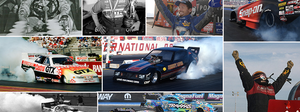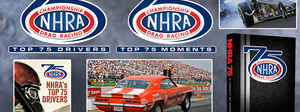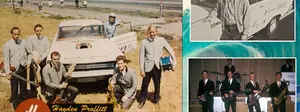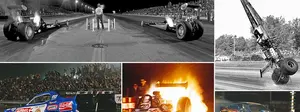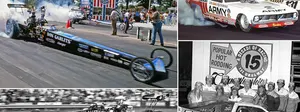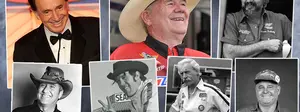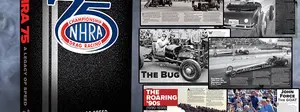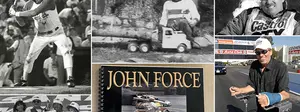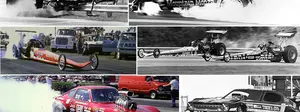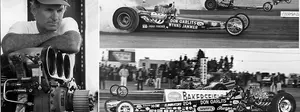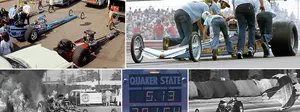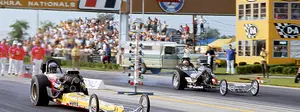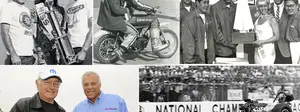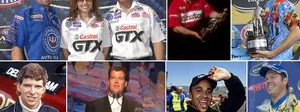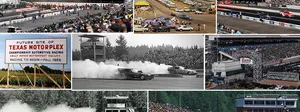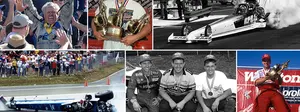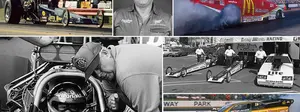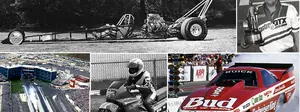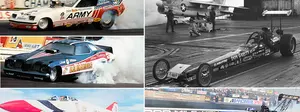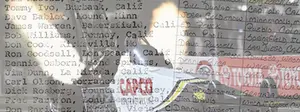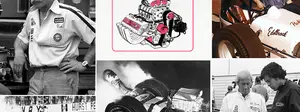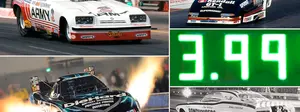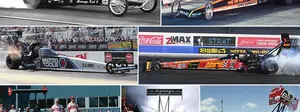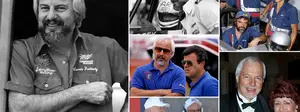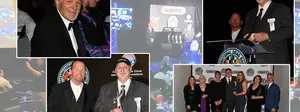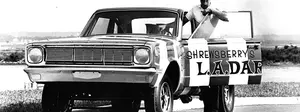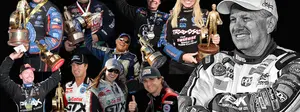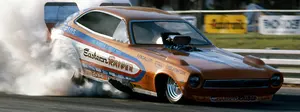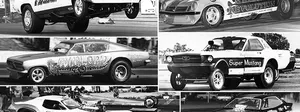'Ace'-ing the first two races

Ed McCulloch, left, the first Funny Car driver to win the season's first two events back to back (1972) and his current driver, Ron Capps, the most recent to do it, celebrated in the Pomona winner's circle.
|
Ron Capps is off to the best start by any Funny Car driver in the last dozen years, which does my heart good after seeing him come so close to the championship so many times and knowing that his crew chief, Ed "the Ace" McCulloch, has never won a championship. Apparently, I'm not the only one happy. I texted Capps a half hour or so after his Phoenix victory Sunday, but he didn’t return the text until Tuesday evening, which had me a little puzzled. He told me he hadn't replied sooner because he had received "a lot" of such congratulations. I asked how many but didn't hear back from him for a long time. Was he digitally dissing me … again? Nope. Apparently, he took the time to actually count them all and reported that he received 153 text messages from well-wishers. I'm impressed.
Anyway, back to the original thrust of this column ...
Capps became just the fifth driver in Funny Car history to begin the season with back-to-back wins and the first since John Force in 1997. Ironically, the first driver to do it was McCulloch, who pulled the back-to-back in 1972, winning the season-opening Winternationals in Pomona and the Gatornationals a month or so later. He also added a third straight win, at the Springnationals, before finally losing in the final round of the Summernationals.
 |
McCulloch, who was a farmer in Forrest Grove, Ore., had begun his career in gas dragsters in the late 1950s before moving to Top Fuel in 1963, when he at one time held the prestigious No. 1 spot on Drag News' Mr. Eliminator chart with the Northwind dragster. He drove a slew of different cars, including the Whipple & Goddell, Scotty's Drive-In, and Terry Majors machines, before switching to Funny Car in 1969 with Art Whipple in a Chevy-powered Camaro, though they quickly adapted to the Hemi with a new Barracuda the next season.
By the time he began his reign of terror in 1972, McCulloch was already on the national radar screen in the Funny Car ranks after scoring his first win the season before -- at the U.S. Nationals, no less, his first of six wins at the Big Go – and had been runner-up to Gene Snow at the 1970 World Finals at Dallas Motor Speedway.
McCulloch and Whipple already had established themselves as hitters on the match race and divisional trail, and adding Revell as a major sponsor during the winter as part of the Indy windfall made it clear that "the Ace" had arrived. The Revellution Duster looked first-class all the way.
McCulloch overcame early woes to qualify sixth in Pomona in 1972 with a last-ditch 6.93, almost a tenth behind polesitter Pat Foster's 6.84 in Barry Setzer's Vega. Ironically, McCulloch and Whipple were outperformed in qualifying by their 1971 car, a Barracuda owned by Jim Murphy and driven in Holy Smokes livery by defending Winternationals champ Butch Maas, who had won the race the year before while driving Roland Leong's Hawaiian. Also ahead of McCulloch was his current boss, Don Schumacher; Leroy Goldstein in the Candies & Hughes entry; and Tom McEwen in his Ramchargers-powered Hot Wheels Duster.
McCulloch got his "Ace" nickname from his Northwest battles with Jerry "the King" Ruth -- McCulloch noted that only an ace can trump a king. He opened his Winternationals account by demonstrating that theory and defeating Ruth's Pay-N-Pak Mustang in the first round, 6.90, 218 to Ruth's 6.96, 209.
McCulloch then socked it to his old car in the second round, hammering out low e.t. with a stout track record 6.65, 217.91 to beat Maas' 6.84, 216.34. The track record entering the race was 6.93, showing how far the still-fledgling Funny Car class had come in a year.
Jake Johnston, at the wheel of Snow's second Dodge Charger, fell next to McCulloch, and I'll bet it’s a loss that he still remembers. In order, the parachute deployed in the bleach box, he red-lighted, and the rear end broke. Ouch.

McCulloch got his 1972 season off to a fast start by tracking down Dale Pulde in Mickey Thompson's Pinto in the final round at the Winternationals.
|
McCulloch took an easy 7.79 stroll to the final round, where he met 21-year-old Dale Pulde at the wheel of Mickey Thompson's Pinto. Pulde, who was fresh off a win at the AHRA Winternationals, was fortunate to even be in the final, having narrowly escaped the first round against Twig Zeigler, who shut off. Pulde's Ed Pink-powered Pinto had been headed toward the centerline, but the talented shoe had time to gather it up and get it pointed correctly to record a 7.88 win. After beating Roger Lindamood in round two with a 6.93, Pulde's sharp driving also paid off in the semifinals against Foster, where both he and "Patty Faster" smoked the hides; Pulde outpedaled him for a thrilling 7.57 to 7.78 victory.
The final was as lopsided as the pre-final times would indicate. McCulloch ripped off yet another 6.6-second effort, a 6.68 at 215.82, to handle Pulde's early shutoff 7.22, 154.63.
Also at that event, Carl Olson and partner Mike Kuhl won Top Fuel for their first win, and Bill Jenkins' radical small-block (327-cid) Vega scored an upset in Pro Stock that paved the way for today's tube-framed chassis.
McCulloch's fast start became even more impressive when he won the fabled March Meet three weeks later. Whipple had decided to wrench Ed Wills' new Mr. Ed car with Kelly Brown driving, so "the Ace" hopped back into his old car and teamed with Murphy to rout the troops in Bakersfield. After setting low e.t. at 6.96, he defeated Jim Dunn's rear-engine Dunn & Reath 'Cuda, which succumbed to a broken clutch during its final-round burnout.
Six weeks and 2,500 miles removed from his Winternationals triumph, McCulloch scored again. Although Whipple's name still was on the Revellution Plymouth, he no longer was actively involved in its running, making McCulloch's Gainesville win even more impressive.

(Above) What should have been a monster semifinal match at the Gatornationals between McCulloch, near lane, and Pat Foster ended when the Foster-driven Barry Setzer Vega caught fire on the starting line. (Below) McCulloch added his second Wally of 1972 by beating Larry Arnold's Kingfish in the final.
|
 |
Foster and the Setzer car once again starred in qualifying, pounding out a stunning 6.53 and following with a jaw-dropping, tire-hazing 6.52 in eliminations, both the quickest passes in class history. Maas and McCulloch had qualified 2-3 behind Foster with times of 6.63 and 6.65.
Lew Arrington's Brutus Mustang jumped off the line ahead of McCulloch in round one, but "the Ace" had a top-end charge up his sleeve and roared past to take a 6.63 to 6.74 victory at 220 mph. McCulloch followed with an almost routine 6.69 to beat Joe Jacono's Brief Encounter.
Hot off his freewheeling 6.52, many people figured Foster for the sport's first 6.4-second pass, and McCulloch was the decided underdog despite his early-season heroics. What should have been a titanic clash never came to the line. Foster's engine caught fire during the start-up, and the quick-thinking crew quickly extinguished that blaze and lowered the body. Unfortunately, the flames had also reached the body as when it was lowered over Foster, flames could be seen licking out of the body's injector hole. Foster had no choice but to shut 'er down and watch McCulloch single into the final.
Larry Arnold, winner late in 1971 of the Supernationals in Ontario, Calif., was McCulloch's more than capable opposition with his Kingfish 'Cuda and meted out a strong 6.68, 218.44. McCulloch was ready for him, though, and responded with his best run of the meet, 6.54, 224.43, to secure the win.
McCulloch wasn't done yet. He also won the Springnationals, in its first year in Columbus, Ohio, sitting down Gary Henderson and Johnston in the first two frames to set up with Foster a rematch of their missed tangle in Gainesville. Foster again had qualified No. 1, at 6.67, low e.t. of the meet, but again the race was over before the green, this time because of a rare red-light by Foster. In the final, McCulloch put away tire-smoking Leonard Hughes to run his record to a perfect 12-0.

McCulloch ran his unbeaten streak to 15 rounds before his battle-scarred Duster lost in the final round of the Summernationals to Don Schumacher.
|
McCulloch ran his round streak to 15 by reaching the Summernationals final, which in and of itself was pretty miraculous as a booming blower explosion at a match race the week before had shredded the Duster body. McCulloch had repaired the body himself, and it came to the event bearing battle scars front and aft. He worked his way to the final to face Schumacher, whose mount also had been heavily damaged the weekend before in a crash. Schumacher got the better of "the Ace" in the final round, 6.63 to 6.84, to end his amazing string.
Had this been a season in which the championship was decided by points, McCulloch undoubtedly would have won the title that still eludes him. Unfortunately for him, back then the title was still decided on the outcome of one race, the World Finals, where Larry Fullerton took the crown. With any luck, McCulloch will get that long-awaited and well-deserved championship this season, some 37 years late.
Between McCulloch and Capps, three others also opened the season with at least two wins. Don Prudhomme twice began with multiple wins (three straight in 1975 and five straight in 1976 en route to seasons of six and seven wins); Frank Hawley won the first two races of what would be his first championship season in 1983; and Force won two straight to begin 1997 but didn’t win again until the Brainerd event that year.



